The best varieties of uncovered grapes for the Moscow region
Grapes for the Moscow region must be frost-resistant - frosts occur in the regions, the weather changes sharply, heat is replaced by cold. Varieties that do not require shelter for the winter do not cause trouble in growing. Gardeners do not waste time preparing covering material; plantings can withstand temperatures as low as -30°C. It is recommended to pay attention to plants that rarely get sick and are not damaged by insect pests - aphids, wireworms, spider mites. Let's consider the best varieties of uncovered grapes for the Moscow region, the features of their cultivation.
Uncovered winter-hardy grape varieties for the Moscow region
According to the ripening period, grapes are early-ripening, mid-ripening and late-ripening. Summer residents will place into separate categories varieties that are resistant to diseases and those with sweet berries.
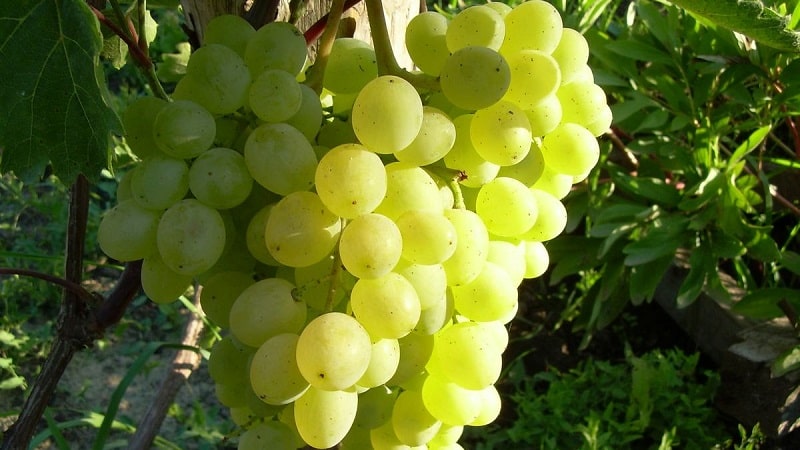
Sweet
Sweet fruits are suitable for fresh consumption and the preparation of desserts, juices, and baked goods. Grapes are used to produce wine and juice, so some varieties are grown in large-scale vineyards. Due to their rich chemical composition, the berries are suitable for a healthy and dietary diet.
Anyuta
The early ripening table variety Anyuta will grow vigorous bushes. For planting, a plot of land measuring 2x2 m is allocated. The leaves of the plant are large, rich green, without pubescence. The flowers are bisexual, so the grapes do not need pollinating insects and bear fruit consistently.The bunch is large, cylindrical-conical in shape, weight - about 600 g (sometimes reaches 1300 g).
The berries are pink, obtuse-ovate, the flesh is dense and juicy. Each fruit contains 1-2 seeds. The taste is sweet, with a nutmeg aftertaste, aromatic, tasting score - 9 points. The grapes are suitable for fresh consumption and processing. After ripening, the berries do not fall off, sit tightly in the bunch, and do not crack.
Bogotyanovsky
The growth of the bushes is high, the foliage is average. The green leaves are small, strongly dissected, with bristly, rough pubescence. The flowers are bisexual. The clusters are medium cylindrical-conical, weigh about 400 g. The berries are large greenish-yellow, ovoid in shape. The taste is harmonious and sweet, score - 9 points. The pulp is gristly, the juice is colorless, the aroma is average. The purpose of the fruit is universal.
Bogotyanovsky is slightly affected by diseases and pests and is unpretentious in cultivation. Frost resistance - down to -27°C, early ripening. The harvest is suitable for transportation and storage - the fruits do not spoil, retain their taste and presentation.
Cocktail
Ultra-early ripening table variety. The bushes are tall and powerful, the leaves are large, slightly dissected, bubbly, with strong pubescence. The flowers are bisexual, the weight of the conical bunch is about 400 g. The berries are small, ovoid in shape, yellow-green in color. The pulp is juicy and fleshy, there are 1-2 seeds. The Cocktail variety is valued for its frost resistance, the original taste of the fruit is fruity and berry, with a light aroma. Tasting score for fresh berries: 8.3 points. The fruits are recommended for fresh consumption.
The variety's immunity to disease is average, so it is recommended to take additional protective measures - spraying the plantings with fungicides or a weak solution of copper sulfate.
Early
Early ripening grapes ripen in the Moscow region by the middle or end of July. For healthy growth, the crop is fed with mineral fertilizers - urea, potassium salt, ammonium nitrate. The early harvest is not stored for a long time; it is eaten fresh or processed into wine, juices, and jams.
Ermak
The technical variety is grown on an industrial scale - the berries produce delicious sparkling wines. The flowers are bisexual, the bush is medium-sized. The leaves are large, without pubescence, the color is rich green. The clusters are cylindrical, the berries are tightly pressed to each other. The weight of the bunch is about 200 g, the berries are small black and blue. The taste is simple and harmonious, tasting score - 4.7 points. The seeds are small, the juice is colorless, the flesh is gristly, dense.
Frost resistance - down to -32°C, immunity to diseases and pests is strong. Ermak is grown not only in the middle zone, but also in the northern regions of the country.
Zelenolugsky ruby
The bushes are tall, with medium dissection of leaves, bristly pubescence. The variety is self-fertile and does not require cross-pollination or insects. The clusters are small, loose, conical in shape. Weight - about 200 g, black round berries. The skin is dense and protects the grapes from cracking and insects. The taste of the fruit is sweet and sugary, with a pleasant berry aroma.
Interesting! Technical varieties are used to prepare raisins. To do this, the berries are placed in a dryer for 7 hours, repeating the cycle 2-3 times. To prepare 500 g of raisins, 2 kg of grapes are required.
Zelenolugsky ruby is frost-resistant and is rarely affected by phylloxera and powdery mildew. Ripe berries are universal in use, suitable for transportation, storage, and processing. The tasting rating of dry wine is 7.7 points.
Mid-season
Mid-ripening Moscow region grapes ripen 10–15 days later than early ones. Most varieties are distinguished by larger fruits.
Lunar
A table variety, the clusters are cylindrical-conical in shape, dense, weigh about 500 g. The berries are large, round, weighing about 5–7 g per berry. The color is white-pink, the skin is strong, translucent. The fruits have a slight waxy coating. The pulp is crispy, each berry contains 2-3 seeds. The taste is sweet, harmonious, with a nutmeg aroma. Tasting rating of fruits - 8 points. The variety is frost-resistant down to -22°C, and has high immunity to diseases and pests. Lunar requires shelter for the winter.
Gift from TSHA
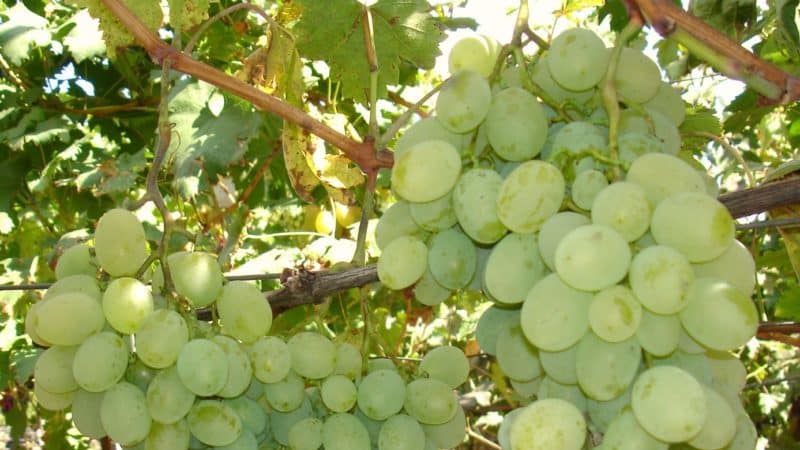
The bushes are medium-sized, the leaves are small, slightly pubescent, bright green. The variety is picky about the planting site, so the soil is fertilized and loosened in advance. The clusters are medium dense, small, weigh about 140 g. The shape is conical, pointed towards the tip. The berries are oval-elongated yellow-green. The taste is sweet, harmonious, with a pleasant nutmeg-pineapple aroma. The pulp is juicy and tender. Tasting score for berries - 7.7 points, juice - 8.5 points.
The fruits are used for fresh consumption, making summer cocktails, juices and smoothies. Among the disadvantages of the variety, average immunity to diseases is noted.
In memory of Strelyaeva
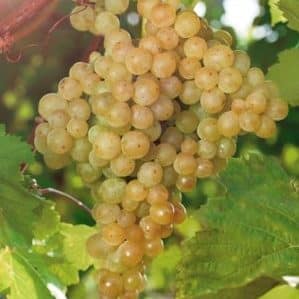
The bush is medium-sized, young shoots are pubescent, green leaves. The plant is unpretentious in cultivation and tolerates lack of moisture. The flowers are bisexual, the clusters are dense, the weight of one is about 240 g. The berries are round, weighing about 2.5 g each. The color is yellow-green, the flesh is juicy and dense. The taste is sweet grape, with a pleasant aroma. Tasting score: 8.3 points. The crop is not damaged by diseases and pests and can withstand frosts down to -30°C. The purpose of the harvest is universal.
Late
Late-ripening grapes are harvested in September - October. The berries are used to make drinks and jam, and dried for raisins. Late fruits are distinguished by their strong skin and thick waxy coating, which protects them during transportation.
Winner
The bushes are medium-sized, the leaves are large, light green. The flowers are bisexual, the clusters are loose, the average weight of one is about 900 g, some reach 2000–3000 g. The color of the berries is dark red or burgundy, with a purple tint, the shape is round-oval, the average weight is 8–10 g. The pulp is fleshy, different a harmonious combination of acidity and sugar content. The taste is pleasant nutmeg, tasting score - 8.7 points. The seeds are large.
The table variety is resistant to phylloxera, rust and powdery mildew, and is slightly damaged by aphids and spider mites. Frost resistance - down to -31°C. It is unpretentious in cultivation and bears fruit consistently. The harvest is suitable for transportation.
Read also:
Hybrid grape Kesha - description and characteristics
In memory of Golodriga
A technical variety, the harvest is harvested in mid-September, fruiting continues until October. After ripening, the berries do not fall off. The bushes are vigorous, with large leaves, medium pubescence. The clusters are cylindrical-conical, the weight of one is about 208 g. The berries are round and black. The pulp is juicy, the taste is sweet and harmonious. The juice is wine-colored, there are 2-3 seeds. The tasting rating of the dessert wine is 7.9 points. The variety is weakly affected by insects and diseases.
Disease resistant
The most dangerous diseases of grapes are gray rot and oidium. If symptoms of infection are not detected in time and measures are not taken, diseases will destroy 60–80% of the crop.
Rubin Azos
Technical frost-resistant variety with medium-late ripening period. The bushes are medium-sized, the leaves are small, slightly dissected. The clusters are branched and loose, weigh about 240 g. The berries are round, the average weight is 2 g. The skin is dense, black, with a waxy coating. The pulp is juicy, the taste is sweet, with a slight sourness, harmonious. Tasting score: 7.9 points. Ruby Azos can withstand frosts down to -34°C, bears fruit stably, and is not affected by viral and fungal diseases.
Strepenny
Technical grapes of early ripening. The bushes are medium-sized, the leaves are green, with weak bristly pubescence. The flowers are bisexual, the clusters are cylindrical or cylindrical-conical, weigh about 170 g. The berries are small, round-oval, white. Stirrup is resistant to frost, phylloxera, and diseases.
Attention! For preventive purposes, before flowering, grapes are sprayed with Inta-Vir at the rate of 2 tablets per 10 liters of water. Fertilizers containing iodine, boron and zinc are applied to the soil. During the flowering period, pinch the tops of the bushes and regularly remove weeds. In rainy weather, the vineyard is treated three times with the “Bud” preparation.
To increase productivity, the bush is pruned annually and dry and old shoots are removed. The purpose of Stremenny is universal - the fruits are good in fresh, processed, or dried form.
The best wine varieties
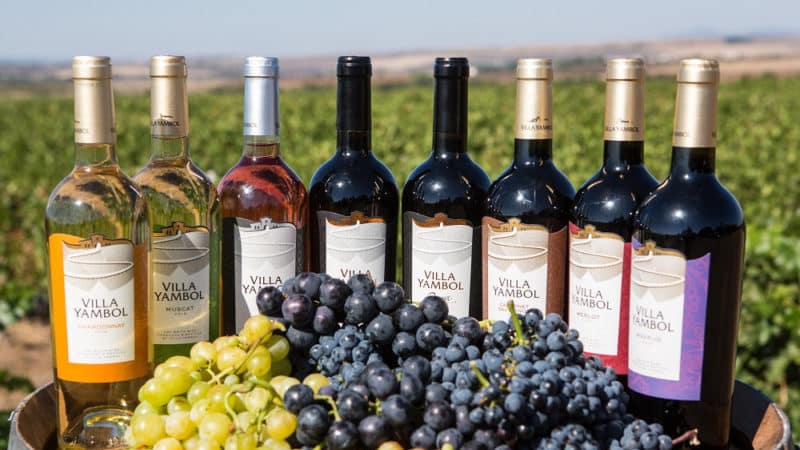
Wine grape varieties in the Moscow region are distinguished by their juiciness and bright aroma, tender and sweet pulp. They have a balanced acid-sugar composition. Of the varieties, Golden Muscat (Rossoshansky) is noted. The bushes are vigorous and prefer loose and well-lit areas. The clusters are cylindrical, weigh 300–350 g, dense. The berries are yellow-green, with a golden tint, the skin is strong, with a waxy coating.The taste is sweet nutmeg, with a pleasant aftertaste. Frost resistance - down to -29°C. The berries do not fall off or crack, and are resistant to fungal diseases. White wines are made from grapes.
To produce the red variety, the uncovered Express variety is grown in the Moscow region. The ripening period is early, fruiting lasts 3-4 weeks. The bushes are medium-sized, the leaves are small, without pubescence. The clusters are winged and loose, weigh 300–400 g. The berries are round, weighing about 2 g each, black in color, with a waxy coating. The aroma and taste are pleasant and refreshing. Frost resistance - down to -32°C, the variety is slightly affected by mildew.
Frost-resistant varieties for gazebos
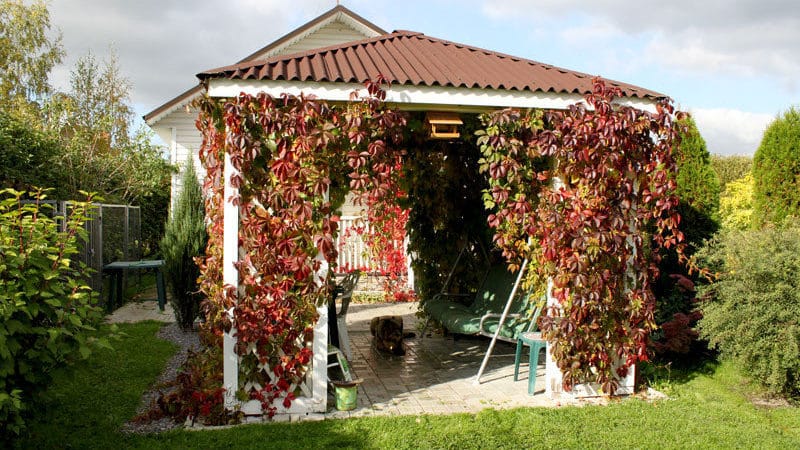
Grapes will decorate a gazebo, fence, and other country buildings. To ensure that the arched vine grows quickly, place the grapes on the sunny side. It is recommended to plant several varieties with different ripening periods at the same time - this way fruiting will continue for a long time.
The gazebo will be decorated with uncovered grapes of the American selection Alpha. The length of the vine reaches 9 m, the leaves are large, the edges are serrated. Alpha blooms in early summer. The ripening period of the berries is 110–145 days, the clusters are large, weigh 150–250 g. The berries are round, the taste is nutmeg, weight is 2-3 g, the color is black-blue, with a purple tint, there is a medium waxy coating. From 10 to 14 kg of berries are collected from the bush per season. The variety is unpretentious in cultivation, frost-resistant, and is rarely affected by diseases.
Summer residents highlight Amur grapes. The length of the vine is 8–12 m; the plant decorates the gazebo from early spring until late autumn. The berries are black and blue dense. The weight of the bunch is about 200 g, the shape is conical. The taste is balanced sweet and sour, with a nutmeg aroma. The harvest is suitable for processing and fresh consumption. Frost resistance of the variety is down to -27°C.
Read also:
Popular delicious grape variety "Aligote"
Conclusion
For planting in gardens and vegetable gardens in the Moscow region, non-covering varieties are chosen. They are frost-resistant, easy to care for, rarely get sick and are not damaged by insect pests. It is recommended to pay attention to the Lunar, Ermak, Kocktail, and Anyuta grapes. They are valued for their tasty and juicy fruits, versatility in use, and immunity. For wine production, golden Muscat or Express is grown, and Alpha or Amur is grown to decorate the gazebo.